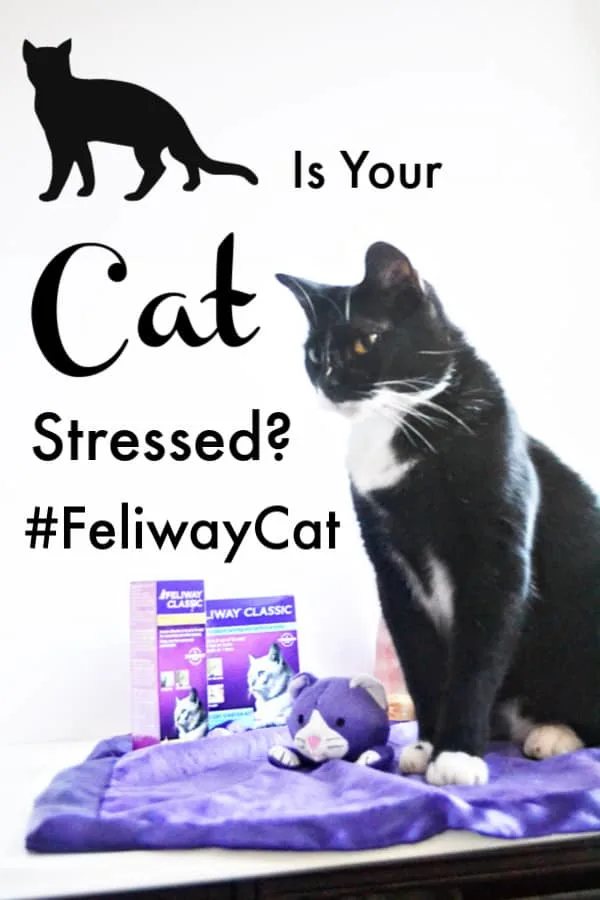
This post is sponsored by Ceva Animal Health, makers of FELIWAY® for cats. All statements and opinions are entirely our own. As always, we only share products that we use with our own pets!
We’ve all known someone who bites their fingernails when they get stressed. And someone else who tends to hit the cookie jar (or ice cream carton) when the stress level rises. Those are all responses to the symptoms of stress–the headache, neck ache, tight muscles, insomnia, and more that we all feel at some point in our lives.
Our cats also feel stress–but the symptoms and responses to that stress are far different than those we see in ourselves.
5 signs of stress in your cat
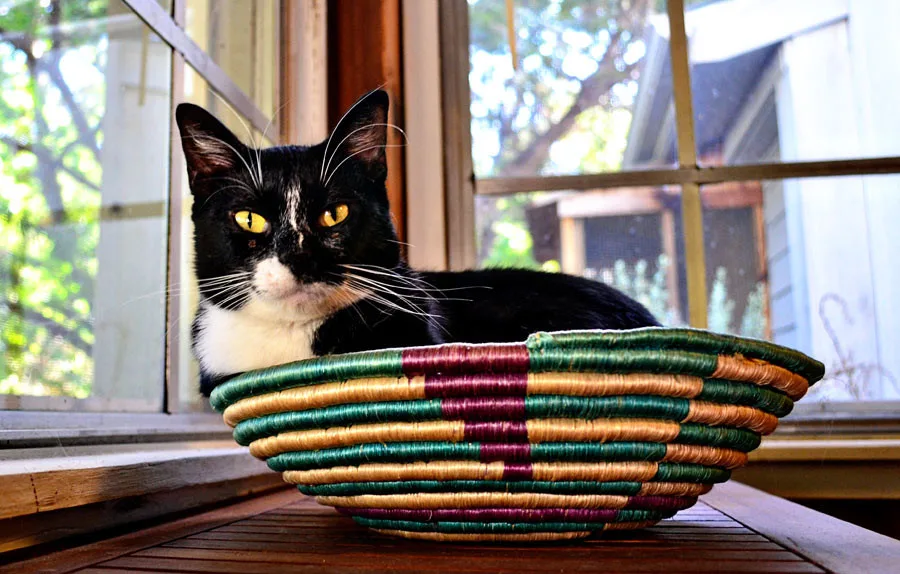
1. Peeing Outside the Box
If your cat suddenly begins urinating outside the litterbox, it can be a sign of urinary tract infection or other health issue–or it can be a sign of stress. Talk with your veterinarian to rule out an underlying health concern then you’ll be able to concentrate on the source of the stress.
2. Picking Fights or Over-Vocalization
Is your cat suddenly picking fights with the other residents in your home–whether that’s fellow cats, other pets, or the human members of your family? Cats–like people–often become more aggressive when under stress, and can take that aggression out on anyone in spitting or slapping distance. Similarly, over-vocalization can be a sign of stress, if your cat usually isn’t the chatty sort.
3. Grooming Too Much
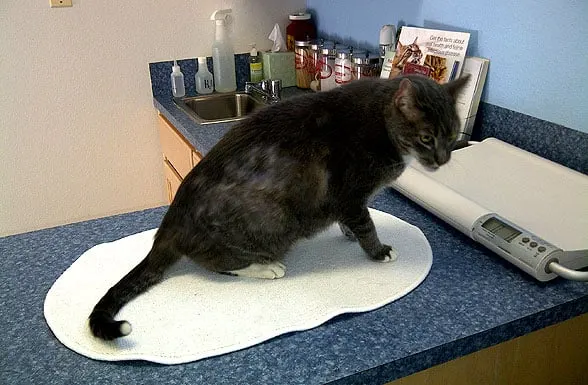
While some cats turn their stress outward on other members of the household, other cats turn the stress inward and begin to overgroom themselves. Years ago, our cat Linus overgroomed to the point of bald patches on his sides. He would groom a spot, literally pull out the fur, and spit it against the wall, all a sign of stress.
4. Eating Less Than Usual
While we as humans might overindulge in comfort foods during times of stress, our cats will often do just the opposite, eating too little when stressed. Again, as with urinating outside the box, you’ll want to talk with your veterinarian to rule out an underlying health issue then concentrate on identifying the source of the stress.
5. Being Anti-Social
If you find your cat suddenly isolating himself, that can be a sign of pain, illness or stress. Talk with your veterinarian and, if he’s stressed, work to identify the cause of the stress.
5 sources of stress for your cat
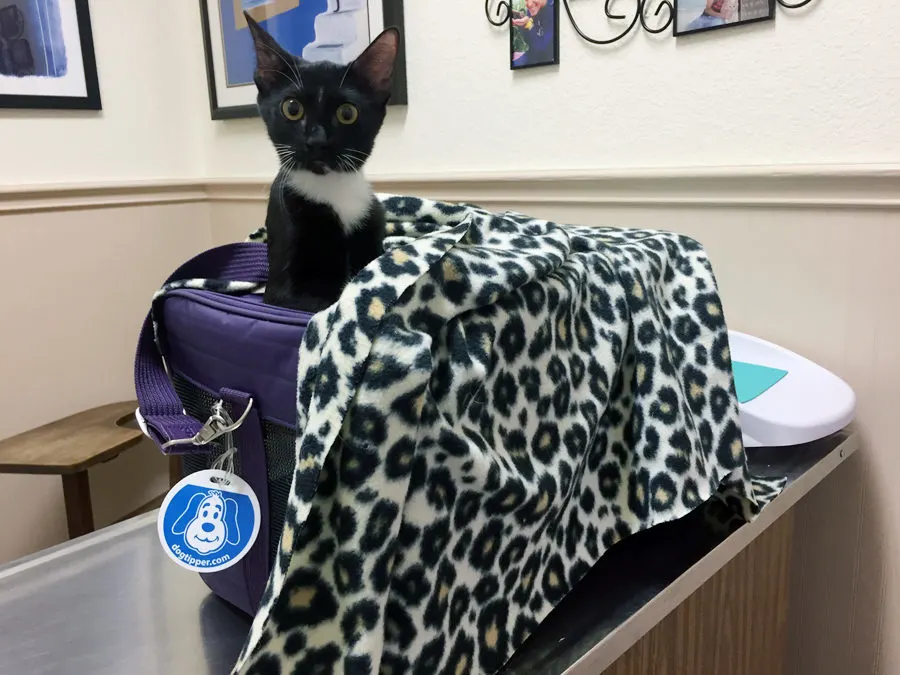
1. A New Family Member
Whether the new member of your house has four legs or two, they represent a source of potential stress for your cat. If you’re bringing a new resident into the house, expose your cat early–whether that’s visits from the new resident or, in the case of a baby, purchasing of baby furniture early and adding new items gradually so your cat can adjust before the arrival. If you’re adopting a new pet, you’ll find many ways to help comfort your resident cat when you introduce a new cat or dog.
2. A Change in Your House
A move into a new home is stressful on us all, and we’ve got a post on 10 Ways to Help Your Cat Stay Calm When Moving. But it doesn’t take a full-blown move to cause stress in your cat; new furniture–or even rearranging your existing furniture–can be a trigger for stress in some cats.
3. A Change in Routine
Cats like routine and thrive when their day is predictable. But change happens. Whether your routine changes because you start a new job, your oldest child leaves for college, or a repair crew comes to put a new roof on the house, each can be stressful for your cat. The holidays can bring their own stresses–holiday houseguests or dinner guests or perhaps boarding or a cat sitter if you are traveling.
4. Outdoor Stresses
Indoor cats are always aware of what’s happening around their home–and that can spell stress, too. If your cat is seeing an outdoor cat, dog or wildlife, it can create stress.
5. Vet Visits
Trips to the veterinarian’s office–whether made by your cat or another cat in your household–are very stressful for your cat. You can reduce stress by taking steps to help your cat remain calm in her carrier, in the car, and at the vet’s office–as well as reducing stress between cats when reintroducing them after a vet visit.
5 ways to relieve stress in your cat
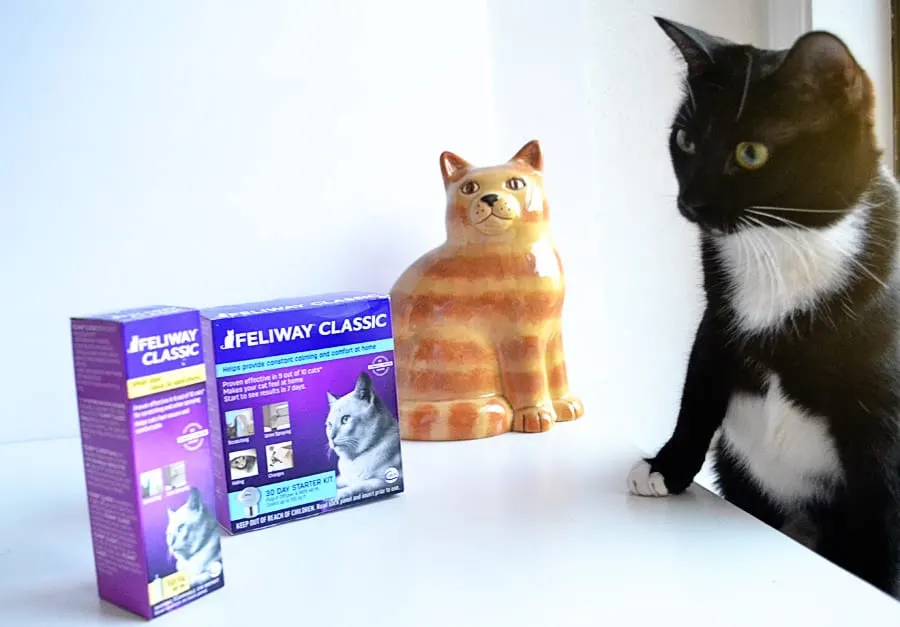
1. Play with your cat
Just as play reduces our stress, it will reduce your cat’s stress as well. Introduce new playthings into your cat’s environment, even if it’s as simple as a new box or a paper sack from the grocery store. Scratching is also a very natural way to relieve stress; use FELISCRATCH by FELIWAY® to help redirect your cat’s scratching to a scratching post.
2. Use FELIWAY® CLASSIC Spray on your cat’s bedding or carrier
FELIWAY® CLASSIC Spray can be used on your cat’s favorite bed, perch, or inside the cat carrier to help relieve stress wherever your cat is hanging out. This natural feline facial pheromone sends “happy messages” to help your cat feel calm.
3. Plug in a FELIWAY® CLASSIC Diffuser
As with the FELIWAY® CLASSIC Spray, the FELIWAY® CLASSIC Diffuser copies the feline facial pheromone to provide a continuous calming effect. The diffuser won’t impact you (or dogs in the household) but your cat will get calming reassurance. The diffuser covers an area of about 700 square feet.
4. Plug in a FELIWAY®MultiCat Diffuser
The FELIWAY® MultiCat Diffuser helps reduce tension and conflict between cats, a great way to keep multiple cats happy and peaceful in times of stress. Like the FELIWAY® CLASSIC Diffuser, this diffuser has no impact on dogs or humans.
5. Spend more time with your cat
In our increasingly busy world, it’s easy for the day to get away from us. Be sure to designate a portion of the day just for your cat. Whether you’re grooming your cat, playing with her, or just hanging out on the couch together, this special time can help reduce your cat’s stress–and you just might find it helps reduce your own stress as well!
For more information on FELIWAY®:
- visit the FELIWAY® site
- where to buy FELIWAY®
- follow Feliway US on Facebook
- follow @FeliwayUS on Twitter
- follow on Pinterest
- 🎉 GIVEAWAY: Lord of the Pets Portrait of Your Cat! - November 26, 2024
- Review: Lord of the Pets Cat Portraits! - November 26, 2024
- Cat Adoption: FAQ You Might Have - June 28, 2024
